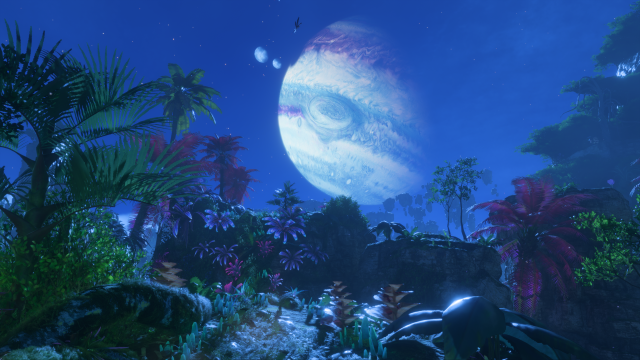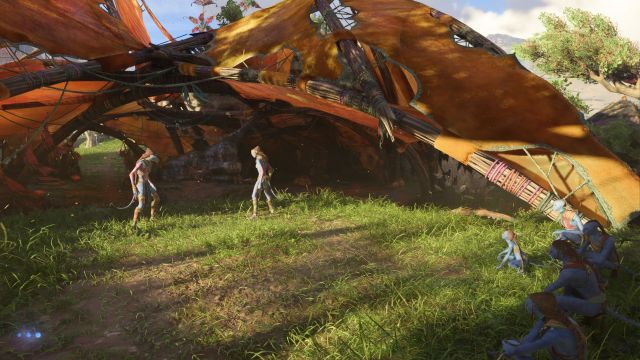When the first Avatar movie came out, I chanced upon an Imax showing while knowing nothing at all about the movie. When I left the theater, the only thing I recall feeling was a deep sense of yearning, almost like nostalgia for a world I had never seen before. I wanted to fly. I wanted to hunt, be hunted, and run through the jungles of Pandora. 14 years later, I found myself scratching an itch that I had forgotten was ever there. I was flying on the back of an Ikran in Avatar: Frontiers of Pandora for the first time while the same hauntingly triumphant orchestral score from the film of 14 years ago played, and I could almost feel the cooling spray of foam from the waterfalls I was soaring over. It wasn’t until this moment in the game that it really set in—this IS Pandora. I was finally there.
Call me a hater, but I always expect games that are based on movies to suck. Perhaps it’s because I’ve been hurt before, or maybe it’s a subconscious bias toward original storytelling—but I went into Avatar: Frontiers of Pandora with the belief that it would be okay at best. I’ve never been so happy to say that I was so completely wrong.
The call of the wild

Avatar: Frontiers of Pandora’s major triumph is in its world building. Given the popularity of the film franchise, it would have been easy and ultimately successful for Ubisoft to simply slap the Avatar label over the game, render out some jungles, add a flying mount, and call it a day. Instead, it approached designing Pandora like it was an indie company making a pitch for a brand new world. The depth of Pandora doesn’t just match that of the films, it far exceeds it. Playing this game will bring you to multiple different biomes that have never been seen before in the films, and some of them are as comparatively unique to the Pandora we saw in the films as Pandora is to our real world.
The magic doesn’t stop in the environment, either. The entire map has a hand crafted and full feeling to it, as if each little corner is meant to be the main focus of the game. There are literally dozens of Na’vi encampments that the main story will never bring you to, and all of those encampments offer side quests with quirky, personal, emotional, and even sometimes funny stories. The typical “go here and kill this” side quest was rightly shunned in Frontiers of Pandora—in this game, side quests will have you assisting Clan Elders as they attempt to learn new musical instruments, counseling star-crossed lovers and guiding them towards one another, saving local insect colonies, painting murals alongside other Clans to commemorate new bonds, and so much more. The attention to detail while dealing with such relatively small scale issues makes you feel like you’re really getting a special glimpse into the day-to-day lives of the Na’vi, and I found myself feeling proud as I grew closer to different Clans through the completion of side quests.
While you’re exploring Pandora, you can find hidden collectibles in the form of Sarentu Totems, Memory Paintings, and more. These collectibles each have unique and engaging mini-games, and they also grant insightful lore and new gear. It’s gotten to the point where I feel like somebody who has only seen the movies and hasn’t played the game doesn’t really know about Pandora and the Na’vi people. I could spend dozens of hours simply soaring on my Ikran (I named her Telisi, and my character actually says that name aloud) in search of Pandora’s collectibles, and I would be grinning the entire time.
Finding your footing

Unfortunately, the introduction and first hour or so of Avatar: Frontiers of Pandora does a bad job at marketing the game. The introduction is short, consists of mostly first person cutscenes, and doesn’t really give you enough time to get emotionally invested in the characters being introduced. In fact, the introduction made me think this was going to be a mediocre game. It isn’t.
While the story never quite becomes nuanced or complex, it does pack tons of emotional weight and had me yelling at my computer screen in anger on several different occasions. At one point, my girlfriend came into the room with teary eyes because she had been secretly listening from the other room. “They didn’t…” she said. The moment was bittersweet. On the one hand, the emotional turmoil we both felt was uncomfortably palpable—but in the back of my mind, I did have that little voice saying, “Damn, this game is good.” The next quest dealt in cold, calculated revenge—and I loved getting to tell my girlfriend that the Zeswa Clan and I were getting back at the bastards who hurt us.
The enemy variety leaves something to be desired, however—there are humans, humans in mech suits, humans in other mech suits, and humans in helicopters. Fortunately, even on medium difficulty, enemies pose a very real threat, so I wouldn’t say that I ever got bored or went into autopilot during a fight.
The underwhelming enemy variety is made up for by a beautifully complex natural ecosystem on Pandora—there’s hunting, gathering, cooking, and crafting, and each system is eloquently developed. Animals and ingredients all have corresponding Hunter’s Guide pages, where you can learn which biomes offer higher tier variants and what conditions are ideal for harvesting. While hunting, you can even use Na’vi Senses to track animals by their scent, and there is an ingredient bonus for making Merciful and Clean Kills, such is the way of the Na’vi.
Every additional hour that I put into this game feels more compelling and immersive than the last. If you think you’ve seen all there is to see, trust me—you haven’t. The features, mechanics, and quirks of Avatar: Frontiers of Pandora seem to grow exponentially rather than linearly, and I feel like Jake Sully in the first film scarfing down his meal in his human form so he can return to his Avatar body and get back out to Pandora. This game really is a gift that keeps on giving. In fact, I feel like I could write another 15 paragraphs about all my favorite things in Frontiers of Pandora. Instead, I’ll simply say—play this game.
- Absolutely breathtaking visuals.
- Hand crafted and immersive open world.
- Complex but intuitive gathering and crafting systems.
- A faithful but fresh expansion to the films.
- Lacks enemy variety.
- Limited character customization options.
- Clunky cutscenes that feel dated.



Published: Dec 6, 2023 06:01 am